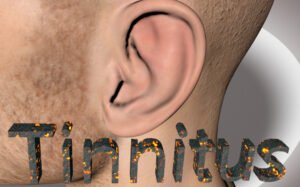It’s during the quiet moments that tinnitus is at its loudest. People with tinnitus hear a noise in their heads that has been compared to everything from a tinkling bell to a jet turbine. In a more scientific description, Jack Vernon, Ph.D., professor emeritus of otolaryngology at Oregon Health Sciences University in Portland and a board member of the American Tinnitus Association, says the average tinnitus makes a 7,000 hertz tone. For comparison, the highest note on a grand piano makes a noise in only the 4,000 hertz range. With that in mind, you can see how tinnitus might monopolize your attention.
Because it is the real perception of a phantom sound, it can be difficult for the people around someone with tinnitus to understand what the person is going through, says Stephen Nagler, M.D., director of the Southeastern Comprehensive Tinnitus Clinic in Atlanta.
“Just because the sound exists only in your head doesn’t mean you’re crazy. The tinnitus sufferers have lost their silence. It’s an incredible loss. It’s incredibly real,” Dr. Nagler says.
And it’s surprisingly common. According to the American Tinnitus Association, almost 50 million Americans have tinnitus in some form and 12 million require medical help for it.
If you start getting it when you are older, it is particularly distressing because you may already have some hearing loss. Combine the constant, annoying ringing, buzzing, hissing, or thumping noises of tinnitus with an ever-present hearing problem, and it is a recipe for frustration.
The causes of tinnitus are varied and not completely understood. Trauma, exposure to loud noise, and toxic reaction to medicines can all cause ringing in the ear. It can be temporary or permanent. Whatever your personal experience with it, tinnitus is a sign of something gone awry in your auditory system, Dr. Vernon says, so be sure to see a doctor. Meanwhile, here are some remedies to help you cope.
Try This First
Mask the noise. Some people with tinnitus can mask the ringing. To determine if masking can help you, try this simple faucet test. Go to the kitchen sink and turn the water on full force. If the sound of that running water makes it impossible or very difficult for you to hear your tinnitus, then wearable tinnitus maskers will probably work for you, Dr. Vernon says.
You could purchase these maskers from some audiologists. Or you could simply create your own low-tech masker by tuning your radio to FM static (it’s important to use FM since it’s smoother than AM static). You can get a broad-band background noise that can distract you from your tinnitus.
Other Wise Ways
Listen to the sounds of nature. You may not be able to have a waterfall, an ocean wave, or a rain shower in your living room, but you can buy tapes of these natural noises. Play these noises softly to help cover up the tinnitus. They are unlikely to distract you from your daily activities. You are trying to avoid sounds that can attract attention, otherwise you will not be able to do something else, says Pawel Jastreboff, Ph.D., Sc.D., director of the University of Maryland Tinnitus and Hyperacusis Center in Baltimore.
Throw open a window. It’s low-tech and simple. If you open your windows, the sounds of the outside world can help distract you from your tinnitus, Dr. Jastreboff says. The rustling of the wind, street noises, and birds chirping provide neutral background sounds that will distract you from your tinnitus but won’t distract you from whatever task is at hand.
Try some ginkgo biloba. This herb may help circulation in the inner ear, says Michael Seidman, M.D., medical director of the tinnitus center at the Henry Ford Hospital in Detroit. He says some of his tinnitus patients swear by it for relief. If you take ginkgo biloba, Dr. Seidman advises that you purchase tablets with a 50-to-1 or 24- percent strength and take them three times a day. Allow three to six months for the herb to work. Natural remedies take a while to show their effectiveness, he says.
Add a niacin supplement. Niacin also improves circulation and may help relieve tinnitus symptoms. Begin by taking 50 milligrams twice a day. If you have no response after two weeks, you may increase the dosage by 50 milligrams a week, up to a maximum of 250 milligrams a day. Dr. Seidman warns that niacin may produce an uncomfortable pins-and-needles or flushing sensation, so you can try a “no-flush” niacin if you have these side effects from taking it.
Note: Doses of niacin above 35 milligrams per day should only be taken under your doctor’s supervision.
Take a multivitamin. A deficiency in certain nutrients such as zinc or magnesium can cause or exacerbate tinnitus, so taking a general vitamin supplement every day might help, Dr. Seidman says.
Be smart about your schedule. Because tinnitus can be worse in the evenings when the noises of the day have quieted down, plan to use your noise generators at these times. Extremely high levels of noise, such as those made by chain saws, can trigger a bout of tinnitus or make the condition worse for a few hours, says Dr. Jastreboff. Wear earplugs for protection if you will be exposed to very loud sounds.
Managing Your Meds
More than 70 medicines, prescription and over-the-counter, can cause ringing in the ears as a side effect. The most common are:
• Aspirin
• Narcotics such as morphine (Duramorph) and codeine
• Nonsteroidal anti-inflammatory drugs (NSAIDs) such as ibuprofen
• Antidepressants such as fluoxetine (Prozac) and amitriptyline (Elavil)
Some of the same drugs that can cause tinnitus symptoms are also used to relieve them, notes Michael Seidman, M.D., medical director of the tinnitus center at the Henry Ford Hospital in Detroit. Talk to your doctor about trying a different medication if you suspect that one you are taking is causing tinnitus or making it worse.
Be ready for an MRI. Seniors who may have to undergo magnetic resonance imaging (MRI) for other health reasons should wear earplugs during the scan. Dr. Vernon has had patients whose tinnitus was triggered by the loud noise an MRI machine makes.
Mind your menu. Caffeine and several other food items such as alcohol and the simple sugars found in candy bars can aggravate tinnitus, Dr. Seidman says. Try noncaffeinated beverages and more complex carbohydrates such as pretzels for snacks.
Dr. Nagler has also found that chocolate, spices, and red wine can temporarily aggravate tinnitus. He advises patients to make a prudent decision about whether to enjoy these foods or not. Though they don’t do permanent damage, they can sometimes increase the risk of having a temporary problem.
Relax, there’s hope. Experts agree that stress can aggravate tinnitus. Finding a good way to relax is an individual matter. For more information on tactics that might be helpful, see stress on page 504.










 English (US) ·
English (US) ·